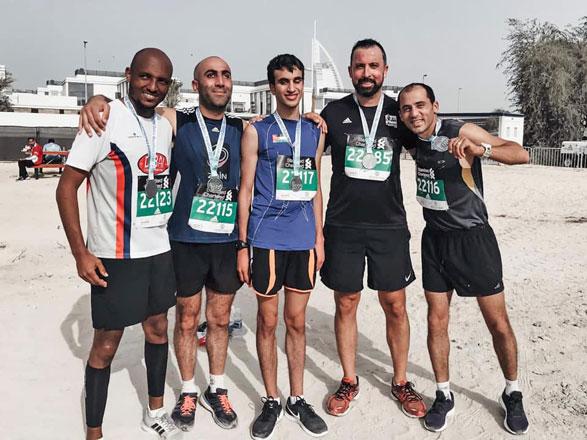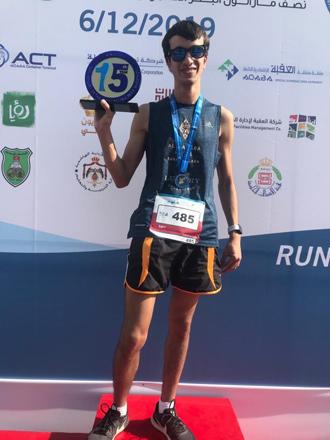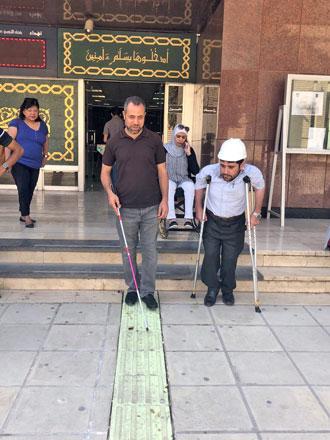You are here
Meet the UJ student striving to ‘break stereotypes’ about disabilities
By Mustafa Ahmed - Mar 06,2019 - Last updated at Mar 06,2019

In this undated photo, Hasan Tayem (centre) poses for a photo after a race in Dubai (Photo courtesy of Facebook)
AMMAN — For Hasan Tayem, the first time he ran long-distance remains a vivid memory. One afternoon, whilst he was in the seventh grade, his PE teacher took his class to a running track. Though nervous at first, he said it would be the start of a life-long love affair.
“I was so tired afterwards. I ran 1km; I had never run this far before. When I went home after school I told my family about it. They were so proud of me they told me to ‘keep going’.”
He would take his family’s encouragement to heart, eventually competing in — and winning — a number of marathons, both in Jordan and abroad. As his medal count grew, so too did his ability to beat his “personal best” (PB) times. Last year, he recorded a new PB of 36 minutes in a Beirut marathon.
These achievements are made all the more remarkable given that Tayem is one of around 25,000 Jordanians who are visually impaired.
In Tayem’s case, he is “fully blind” — his iPhone, for example, is equipped with a screen reader, and when he runs, a guide leads him.
For the 21-year-old undergraduate at the University of Jordan, however, crossing the finish line in record time is only one of his goals. In breaking records, Tayem also hopes to break stereotypes about disability, raise awareness of the problems facing visually-impaired people in Jordan and encourage greater participation by people with disabled in society.
According to Tayem, “I’m trying to reach the best for our culture.”
‘We have a voice’
Achieving this dream, however, requires overcoming a number of barriers — not least of which is a culture of stigmatisation surrounding disability in Jordan.
According to a 2016 report by the Higher Council for Persons with Disabilities (HCD), 13 per cent of the entire Jordanian population were found to be “disabled”, and roughly 16 per cent of those disabled people suffered from some form of visual impairment.
Despite this, “we live in a culture where people are shamed and feel shame for being disabled”, according to Aya Aghabi, founder of Accessible Jordan, a charity dedicated to improving accessibility throughout Jordan.
Part of the problem, according to Tayem, is the attitude of disabled people’s families, who keep their children “hidden” due to cultural shame — a practice criticised by HRH Prince Mired during a recent interview with The Jordan Times.
Tayem, however, was one of the lucky ones.
After being diagnosed as visually impaired at four months old, his parents remained determined that their son would grow up to live as normal a life as possible.
His mother, according to Tayem, “was focused on raising me in a ‘normal’ way”.
Recognising this privilege, Tayem would later try to change the attitudes of those parents and family members who “hid” their children indoors. He would go door-to-door trying to convince these parents that it was possible for their children to live an active life in Jordan, just as Tayem himself was doing.
According to Tayem, his intention was to keep saying “that we [people with disabilities] are here, and we have a voice”.
But worries from the parents over the lack of infrastructure in Jordan, the safety of their children and the financial cost tied to supporting a child with a disability led to Tayem usually being shown the door.
Unaddressed challenges
Tayem was no stranger to those same funding and infrastructure problems — most notably at school, where Tayem’s love for long-distance running blossomed.
He ran as often as he could whilst still in school, “I would train three times a week at the Paralympic Committee, every week.”
But one day, his teacher informed him that all sports classes were cancelled because his school for visually-impaired students had run out of funding, and the cost of taking pupils to the running track was too high.
It would become the start of three years of not being able to run.
According to the Friendship Association of the Blind, the lack of opportunities presented by failing infrastructure and insufficient funding is all too common for Jordanians with a disability: “Persons living with disabilities in Jordan still face several challenges which have remained unaddressed... which include a lack of universal accessibility for people with disabilities.”
For Tayem and his friends, this means that everything from potholes to exposed electrical wires poses a potential hazard.
Despite legislation, such as the Rights of People with Disabilities Law passed by the Lower House in May 2017, which reaffirms the rights of disabled people to education and work, criticism remains over the failure of local governments to properly enforce the law.
When asked whether the municipalities are doing enough to improve accessibility for Jordanians with a disability, Aghabi questioned whether they had an incentive to do so: “Why should the government bother to do anything if the people aren’t going to say anything?”
‘I can do the same things’
Tayem said that studying at the University of Jordan was life-changing for him.
It gave him both the chance to run again, and the realisation that more had to be done to challenge stereotypes and misinformation about visually-impaired people — especially on campus.
With each new class, Tayem would take the opportunity to better inform his peers and his teachers about visually-impaired people, beginning by asking them about some of the stereotypes associated with people with disabilities.
“Some people said things like: ‘Visually impaired people can’t eat by themselves’ and ‘Visually impaired people can’t walk down the street alone’.”
“I wanted to show them that just because I am disabled, it doesn’t mean that I can’t do the same things they do — I can do the same things.”
In Tayem’s opinion, however, “Jordanian people have beautiful intentions — they want to help, but they just don’t know how.”
He recalled one incident he had while walking down some stairs where a person passing by grabbed Tayem’s arm without asking, and led him off the stairs.
For charities like Accessible Jordan, the need to improve awareness is paramount. Aghabi said, “social media campaigns help [to spread awareness], because we need to normalise disability in Jordan. We need to show disabled people in a positive light and we need to show that disabled people can contribute fully to Jordanian society”.
Tayem said that sports are one way of normalising attitudes towards people with disabilities, and that his love for athletics stems from its “suitability” for everyone. “It allows everyone to show their ability, capability and full potential, no matter who they are.”
Tayem said that as graduation looms, he still has one ambition: the desire to run for Jordan at the Paralympic Games in Tokyo next year. He trains three times a week, alongside studying for his exams and working freelance as a translator.
When asked how he would like people to view him, he replied: “When I tell my classmates about me, and my achievements, I don’t want them to focus on ‘Tayem’ — I want them to focus on the fact this is a ‘visually-impaired’ person doing these things... I’m not Superman; I’m visually-impaired and we can all do whatever we want to.”
Related Articles
AMMAN — Hasan Tayem, a 22-year-old professional runner with a visual impairment, recently finished first in the Ayla Red Sea Half Marathon,
AMMAN — “People are always telling me ‘oh, you are so very brave’ or ‘keep fighting!’ but the truth is that there is nothing heroic about ha
Jordan runner Mithqal Abbadi on Friday was crowned champion of the 42km Full Marathon at the 6th Samsung Amman Marathon while Kenyan runner Sarah Kepasso broke all previous records in the same category for women.














